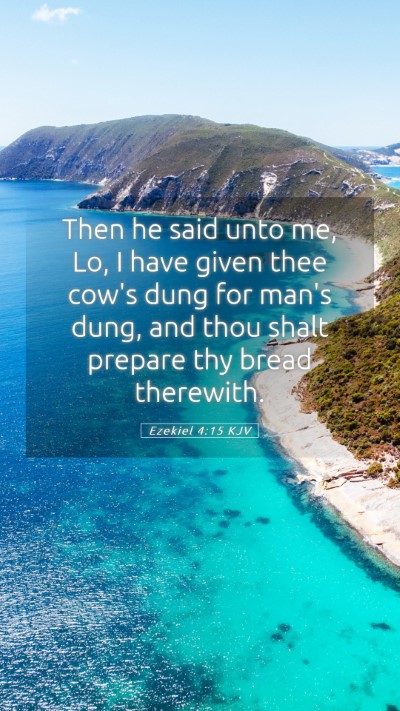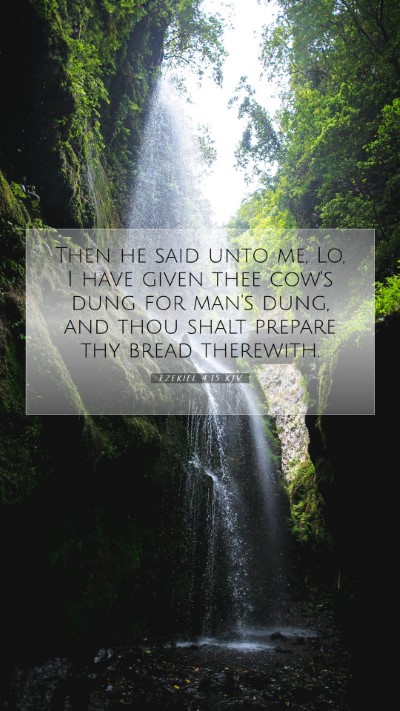Ezekiel 4:15 - Interpretation and Commentary
Verse Reference: Ezekiel 4:15 - "Then He said to me, 'See, I am giving you cow’s dung instead of human excrement, and you will prepare your bread on it.’"
Overview
The passage of Ezekiel 4:15 serves as a vivid example of the prophetic ministry of Ezekiel and the symbolic actions he was instructed to perform. It highlights the importance of obedience to God's instructions, even when they defy human sensibilities. This verse, along with the preceding and following context, conveys profound messages about judgment, purity, and the dietary laws pertaining to Israel.
Summary of Interpretations
Ezekiel's actions were not merely for his own experience; they were meant to be illustrative of the situation facing Israel. The use of cow's dung instead of human excrement symbolizes a merciful concession by God to Ezekiel, given the dietary restrictions of the time.
Commentary Insights
- Matthew Henry's Commentary: Henry emphasizes the mercy of God through this seemingly harsh command. The choice of cow's dung represents a more acceptable option for Ezekiel while still portraying the dire straits of Israel's conditions.
- Albert Barnes' Notes: Barnes elaborates on how such actions portray the significance of ritual purity and the seriousness of Israel’s sins. He notes that God’s instructions served both as a sign and a warning to His people.
- Adam Clarke's Commentary: Clarke points out that Ezekiel’s actions were prophetic signs intended to make a stark point to the Israelites regarding their impending judgment. He underscores the contrast between divine provision and human degradation.
Theological Significance
This verse serves as an example of the broader theme of God's sovereignty and mercy. Through this directive, God illustrates that even during judgment, He allows for proper conduct and sustenance in an otherwise corrupt environment.
Application for Today
The directive to use cow's dung can be seen as instructive for contemporary believers in understanding the need for spiritual purity and obedience to God's commandments. It encourages examination of our own lives to ensure we are living in alignment with divine purposes, even when those paths appear difficult or unconventional.
Related Cross References
- Leviticus 11:2-3 - Dietary laws for the Israelites.
- Ezekiel 5:4 - Further signs of judgment against Israel.
- Isaiah 65:4 - Discussion on dietary practices and unclean foods.
- Jeremiah 15:16 - The delight of God's word contrasted with judgments.
- Ezekiel 3:1-3 - God's instructions for consuming scrolls symbolizing His word.
- Matthew 15:11 - Jesus teaches on what truly defiles a person.
- Romans 14:17 - The kingdom of God is not about food but righteousness.
Exegetical Insights
Biblical exegesis of Ezekiel 4:15 illustrates not merely the historical context of the Israelites during the Babylonian exile, but it invites Bible study insights into how we perceive divine instruction in the contemporary world. Understanding this passage encourages readers to approach Scripture with a heart willing to receive and obey.
Conclusion
As believers engage in online Bible study or participate in bible study groups, the exploration of Ezekiel 4:15 can enhance their understanding of God's nature, His justice, and His mercy. This verse is foundational to grasping the nuances of prophetic actions within Scripture and leads to rich discussions around obedience, dietary laws, and the significance of symbolism in the Bible.


